|
Vocapedia >
Terrorism, Politics
> Northern
Ireland
20th century > The Troubles
Protestants / Loyalists / Unionists
UDF, UVF, UDA, Orange Order
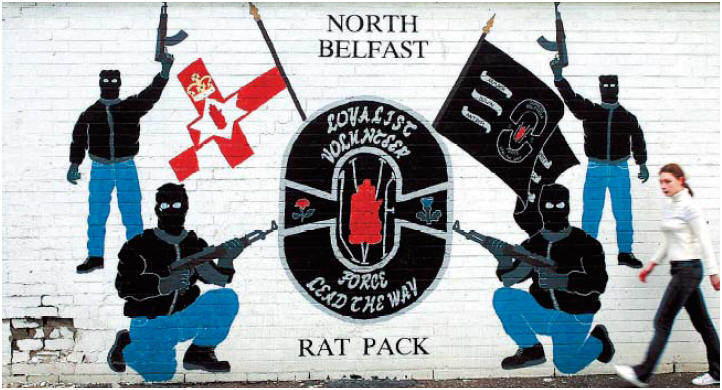
A mural supporting the LVF in north Belfast.
The loyalist
splinter group
says it is considering giving up its arms
Photograph: Charles McQuillan
Pacemaker
Loyalist terror group stands down members
Angelique Chrisafis, Ireland correspondent
The Guardian
p. 4
Tuesday November 1, 2005
https://www.theguardian.com/uk/2005/nov/01/
northernireland.northernireland
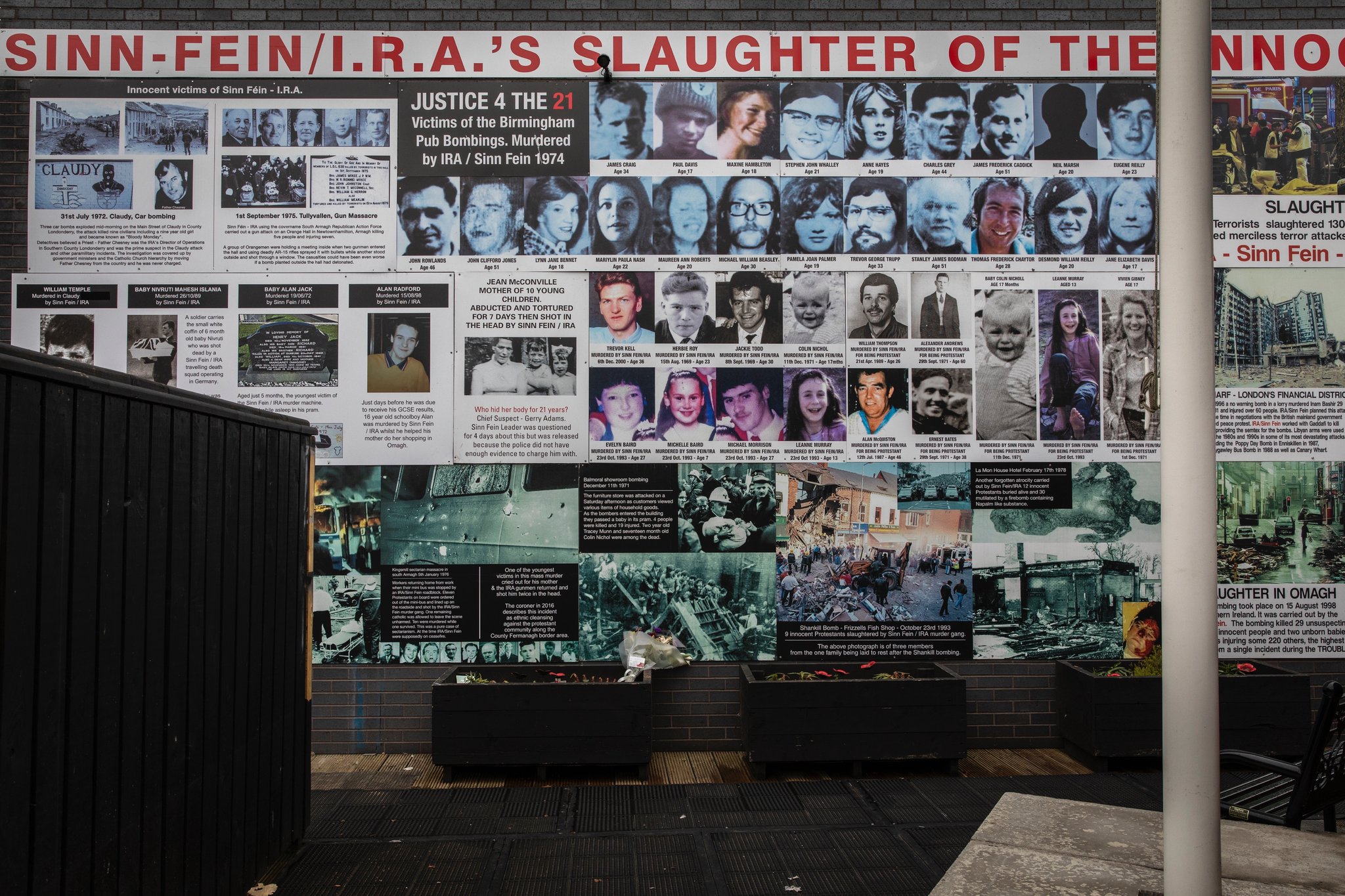
A loyalist memorial in West Belfast.
Photograph: Ivor Prickett
for The New York Times
Will Brexit Bring the Troubles Back to Northern Ireland?
As the United Kingdom confronts the prospect of dissolution,
old factions are bracing for the possibility of new violence
NYT
Published Dec. 30, 2019
Updated Jan. 6, 2020
https://www.nytimes.com/2019/12/30/
magazine/brexit-northern-ireland.html
Protestants
https://www.reuters.com/article/worldNews/idUSL04219180
20080304
Protestant > Geordie Courtney > mob lynching
https://www.theguardian.com/uk/2001/sep/30/
northernireland1
the Glenbryn estate,
a small Protestant enclave
in the predominantly Catholic Ardoyne area
- September 2001
https://www.theguardian.com/uk/2001/sep/06/
northernireland.schools
unionism
https://www.theguardian.com/politics/2010/apr/15/
election-ian-paisley-north-antrim
unionist
Edward Henry Carson Ireland 1854-1935
Irish unionist politician, barrister and judge.
From 1905
Carson was both the Irish Unionist Alliance MP
for Trinity College Dublin
and leader of the Ulster Unionist Council in Belfast.
In 1915 he entered
the war cabinet of Herbert Asquith
as Attorney-General.
Carson was defeated in his ambition
to maintain Ireland
as a whole in union with Great Britain.
His leadership, however, was celebrated
for securing a continued place
in the United Kingdom
for the six north-east counties,
albeit under a devolved Northern Ireland Parliament
that neither he nor his fellow unionists had sought.
https://en.wikipedia.org/wiki/
Edward_Carson - 24 Jnauary 2021
https://en.wikipedia.org/wiki/
Edward_Carson
UK > union flag UK /
USA
http://www.nytimes.com/2013/01/19/world/
europe/new-northern-ireland-violence-may-be-about-more-than-the-british-flag.html
http://www.guardian.co.uk/uk/2013/jan/13/belfast-protest-flag-young-loyalists
http://www.guardian.co.uk/uk/2013/jan/09/belfast-riots-flag-kate-birthday
http://www.guardian.co.uk/uk/2012/dec/09/ulster-union-flag-protests
Ulster loyalist
http://www.theguardian.com/uk/2005/oct/05/northernireland.ukguns
loyalist paramilitaries
http://www.theguardian.com/uk-news/2015/apr/27/
northern-ireland-general-sued-death-catholic-troubles-heenan-kitson
http://www.theguardian.com/uk/2005/dec/21/arts.northernireland
loyalist > Ulster Freedom Fighters
http://www.guardian.co.uk/uk/2010/dec/13/wikileaks-legacy-distrust-finucane-killing
pictureGalleryPopup.jsp?id=5881060&&offset=0&§ionName=News
loyalist > Red Hand Defenders
http://www.guardian.co.uk/uk/2001/sep/06/northernireland.schools
Symbols Used in Northern Ireland
> Unionist and Loyalist Symbols
https://cain.ulster.ac.uk/images/symbols/
unionloyal.htm
West Belfast > loyalist memorial
USA
https://www.nytimes.com/2019/12/30/
magazine/brexit-northern-ireland.html
Protestant / Unionist leader > Ian Paisley 1926-2014
https://www.theguardian.com/politics/
ianpaisley
http://www.guardian.co.uk/politics/2010/apr/15/election-ian-paisley-north-antrim
http://www.guardian.co.uk/politics/2010/mar/02/ian-paisley-northern-ireland
https://www.reuters.com/article/worldNews/idUSL04219180
20080304
https://www.reuters.com/article/worldNews/idUSL04247699
20080304
https://www.reuters.com/article/worldNews/idUSL04219180
20080304
https://www.reuters.com/article/worldNews/idUSL04247699
20080304
http://www.independent.co.uk/news/uk/politics/end-of-an-era-as-paisley-steps-down-791326.html
http://www.guardian.co.uk/politics/2008/mar/05/ianpaisley.northernireland
https://www.independent.ie/national-news/paisley-bows-out-1306979.html
https://www.independent.ie/national-news/
dr-no-will-be-recalled-as-man-who-said-yes-1307016.html
https://www.independent.ie/national-news/
in-the-end-the-rev-knew-his-time-had-run-out-1307017.html
https://www.independent.ie/national-news/
family-ties-may-have-been-the-undoing-of-proud-father-1307018.html
https://www.independent.ie/national-news/
hope-and-peace-will-be-true-legacy-of-an-honourable-man-1307019.html
https://www.independent.ie/opinion/analysis/
the-one-time-demon-doctor-who-finally-did-the-business/26427880.html
http://politics.guardian.co.uk/northernirelandassembly/story/0,,2042840,00.html
http://www.guardian.co.uk/Northern_Ireland/Story/0,,2041729,00.html
http://www.guardian.co.uk/Northern_Ireland/Story/0,,1924457,00.html
http://www.guardian.co.uk/Columnists/Column/0,,1924094,00.html
Paisley heartland > North Antrim
http://www.guardian.co.uk/politics/2010/apr/15/election-ian-paisley-north-antrim
Ian Paisley's Democratic Unionist party DUP
https://www.nytimes.com/2018/09/05/
lens/funerals-skirmishes-and-protests-photographing-ireland-in-the-time-of-bobby-sands.html
http://www.theguardian.com/politics/2014/sep/12/ian-paisley-dup-firebrand-dies-aged-88
http://www.guardian.co.uk/politics/2008/mar/05/ianpaisley.northernireland
http://www.theguardian.com/politics/2004/jan/05/northernireland.devolution
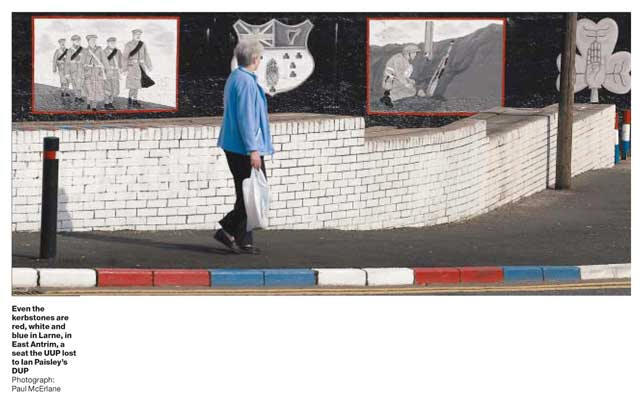
Unionism at crossroad after UUP
defeat in polls
The Guardian p. 12
17 May 2005
https://www.theguardian.com/politics/2005/may/17/
uk.northernireland
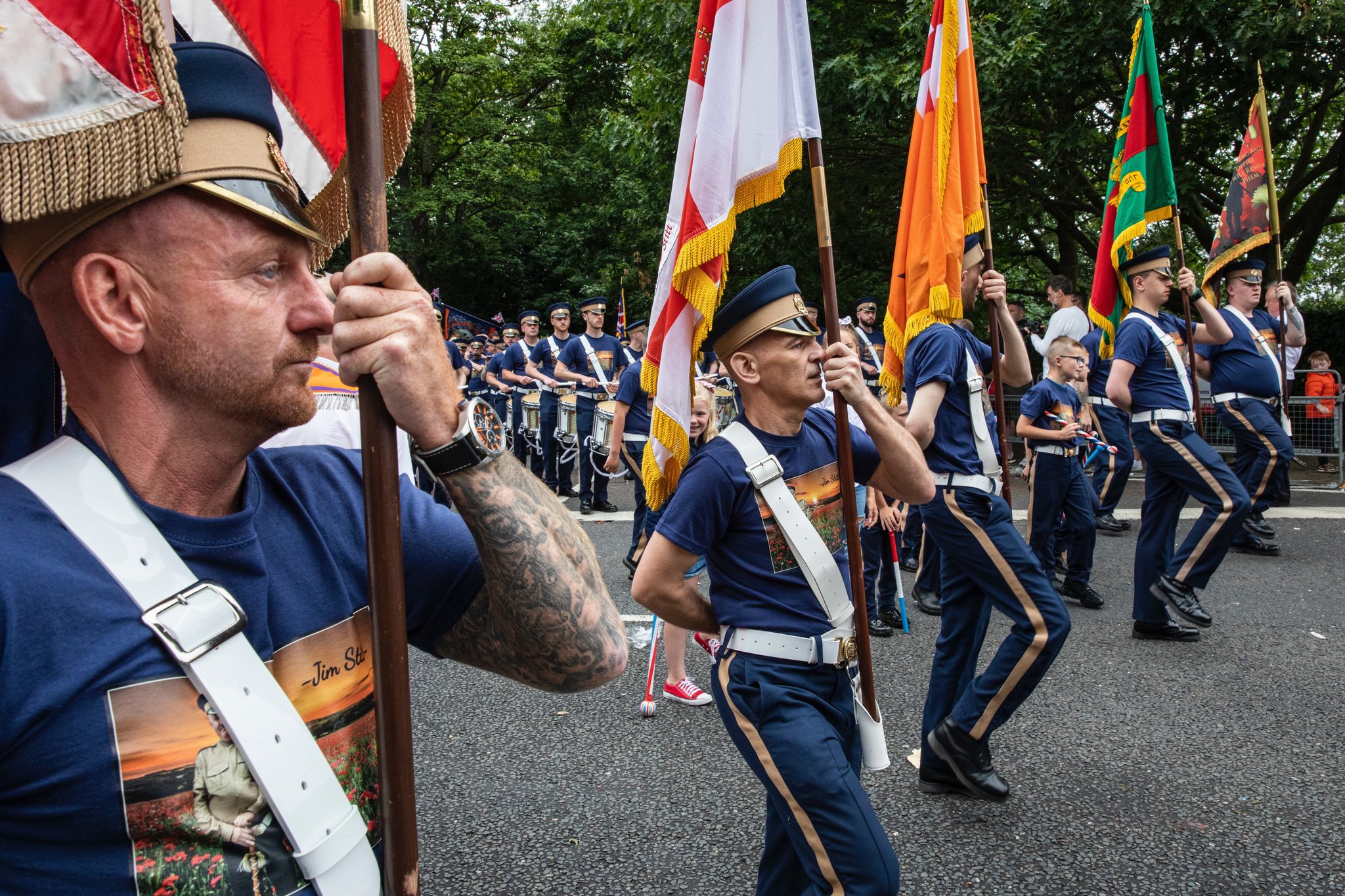
Protestants parading on July 12,
in commemoration of William of
Orange’s
defeat of King James II, a
Catholic.
Photograph: Ivor Prickett
for The New York
Times
Will Brexit Bring the Troubles
Back to Northern Ireland?
As the United Kingdom confronts
the prospect of dissolution,
old factions are bracing for the
possibility of new violence.
NYT
Published Dec. 30, 2019
Updated Jan. 6, 2020
https://www.nytimes.com/2019/12/30/
magazine/brexit-northern-ireland.html
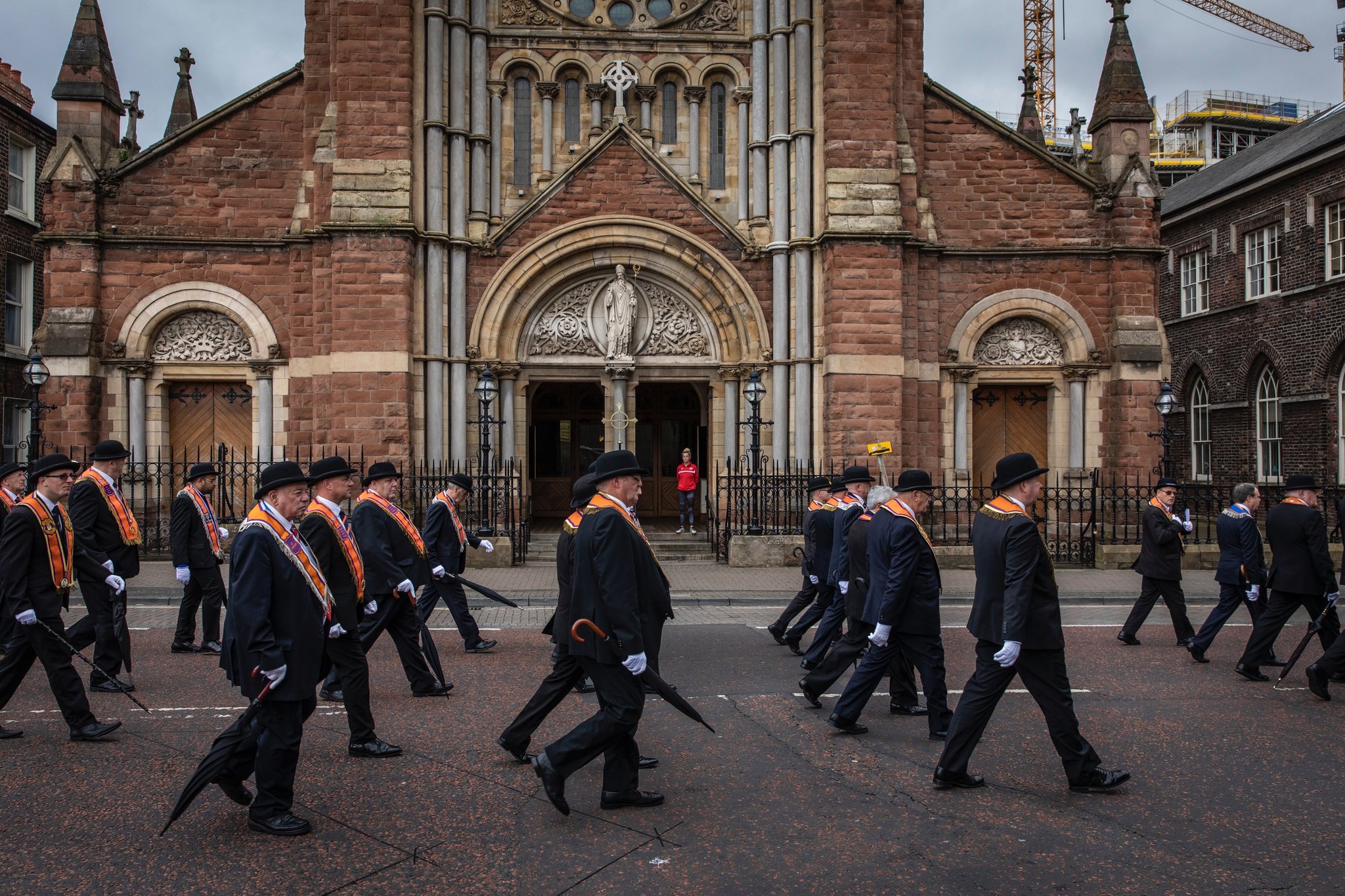
Orangemen marching past a Catholic
church
on July 12 in Belfast.
Photograph: Ivor Prickett
for The
New York Times
Will Brexit Bring the Troubles
Back to Northern Ireland?
As the United Kingdom confronts
the prospect of dissolution,
old factions are bracing for the
possibility of new violence.
NYT
Published Dec. 30, 2019
Updated Jan. 6, 2020
https://www.nytimes.com/2019/12/30/
magazine/brexit-northern-ireland.html
the
Protestant marching season
https://www.theguardian.com/uk/2004/jul/13/
northernireland.angeliquechrisafis
At the
start
of the siege of Londonderry in 1689,
13
apprentice boys slammed the city gates
against the army
of the Catholic King James II.
The
Apprentice Boys of Derry,
one of
the Protestant Loyal Orders,
is
based upon this defiant action of "no surrender".
New
Apprentice Boys
can only be initiated inside the city,
in
ceremonies in August and December each year.
The
order holds its main parade in Derry on 12 August
to
celebrate the relief of the city and the end of the siege.
BBC -
Saturday, August 14, 1999
Published at 04:59 GMT 05:59 UK
http://news.bbc.co.uk/2/hi/uk_news/420061.stm
http://news.bbc.co.uk/2/hi/uk_news/420061.stm
commemorate
Protestant William of Orange's victory
over Catholic James II
at the Battle of the Boyne
in 1690
https://en.wikipedia.org/wiki/
Battle_of_the_Boyne
https://www.theguardian.com/uk-news/gallery/2017/jul/12/
eleventh-night-bonfires-12-july-belfast-northern-ireland-
in-pictures
"The
Twelfth”,
when
Protestants celebrate
King William’s victory
at the
Battle of the Boyne.
http://www.theguardian.com/uk-news/2015/sep/13/
kevin-mcguigan-death-assassin-belfast-political-strife
The Protestant William of Orange's
seizure of the throne
from the Catholic James II
was blatant usurpation,
but it settled once and for all
the conflict
between crown and parliament
https://www.theguardian.com/books/2011/oct/30/
english-dates-1688-glorious-revolution
the
Orange order
The largest Protestant organisation in Northern Ireland
with at least 75,000
members,
some of them in the Republic of Ireland.
http://news.bbc.co.uk/1/hi/northern_ireland/1422212.stm
http://www.guardian.co.uk/news/blog/2012/jul/12/belfast-orange-order-march-scuffles
http://www.guardian.co.uk/world/2012/jul/03/orange-order-address-irish-parliament
http://www.guardian.co.uk/uk/2011/nov/22/orange-order-book-reveals-attitudes
Orangemen
https://www.theguardian.com/uk-news/2013/jul/20/
orangemen-march-ban-protest-belfast
an
Orange gathering
orange
sashes and red, white and blue bandanas
the Orange anthem
> The Sash My Father Wore
"The
Sash"
(also known as "The Sash My Father Wore")
is a
ballad from the Irish province of Ulster
commemorating the victory of King William III
in the
Williamite War in Ireland in 1690–1691.
The
lyrics mention the 1689 Siege of Derry,
the
1689 Battle of Newtownbutler near Enniskillen,
the
1690 Battle of the Boyne
and
the 1691 Battle of Aughrim.
It is
popular amongst Ulster loyalists
and
many other unionists in Northern Ireland,
as
well as in parts of Scotland.
- 27
December 2020
https://en.wikipedia.org/wiki/
The_Sash
Orange
march
http://www.guardian.co.uk/uk-news/video/2013/jul/13/
belfast-orange-order-march-violence-video
loyalist parade
https://www.theguardian.com/uk/2004/jul/13/
northernireland.angeliquechrisafis
loyalist killer / hitman > Michael Stone
Loyalist hitman
joined Ulster Defence Association at
16
https://www.theguardian.com/uk-news/2013/jul/29/
michael-stone-prison-sentence
http://www.guardian.co.uk/uk/2008/nov/14/michael-stone-gerry-adams-uda-northern-ireland
https://www.theguardian.com/uk/2008/nov/14/
michael-stone-northern-ireland-gerry-adams
https://www.theguardian.com/politics/2006/nov/29/northernireland.devolution
https://www.theguardian.com/uk/2006/nov/26/northernireland.northernireland
https://www.theguardian.com/politics/2006/nov/24/northernireland.devolution1
https://www.theguardian.com/uk/2006/nov/24/northernireland.northernireland
https://www.theguardian.com/politics/2006/nov/24/northernireland.devolution2
http://www.guardian.co.uk/uk/2006/nov/25/northernireland.northernireland
https://www.theguardian.com/uk/2006/nov/01/london.northernireland
http://news.bbc.co.uk/onthisday/hi/dates/stories/july/24/newsid_2515000/2515041.stm
loyalist > Ulster Defence Force UDF
loyalist > Ulster Defence Association UDA
http://www.guardian.co.uk/uk/2012/dec/12/pat-finucane-report-david-cameron-apologises
http://www.guardian.co.uk/uk/2012/aug/20/uda-journalist-death-threat-belfast
http://www.guardian.co.uk/uk/2010/jan/06/ulster-defence-association-destorys-weapons
https://www.theguardian.com/uk/2008/nov/14/
michael-stone-northern-ireland-gerry-adams
http://www.guardian.co.uk/uk/2006/jul/30/northernireland.henrymcdonald
http://www.guardian.co.uk/uk/2006/nov/26/northernireland.northernireland
http://www.guardian.co.uk/uk/2005/oct/05/northernireland.ukguns
http://www.guardian.co.uk/uk/2003/apr/20/northernireland.military
http://www.theguardian.com/news/2003/apr/17/guardianobituaries.northernireland
UDA > Brian Nelson, paramilitary 1948-2003
https://www.theguardian.com/news/2003/apr/17/
guardianobituaries.northernireland
loyalist
The Loyalist Volunteer Force LVF
https://www.theguardian.com/uk/2010/sep/13/
billy-wright-assassin-maze-security
https://www.theguardian.com/uk/2005/nov/01/
northernireland.northernireland
hardline leader
of the outlawed Loyalist
Volunteer Force > Billy Wright
http://www.guardian.co.uk/uk/2010/sep/13/
billy-wright-assassin-maze-security
http://www.theguardian.com/uk/2007/apr/10/
northernireland.northernireland1
John Kennaway,
one of the three-man hit squad who gunned down
Loyalist Volunteer Force (LVF) founder Billy Wright
in 1997
http://www.guardian.co.uk/uk/2010/sep/13/
billy-wright-assassin-maze-security
Ulster Volunteer Force UVF
http://www.theguardian.com/uk-news/2014/apr/13/
roseanne-mallon-inquest-troubles-northern-ireland
http://www.theguardian.com/uk-news/2014/mar/12/
arrested-mcgurks-pub-bomb-belfast-1971
http://www.theguardian.com/uk/2012/oct/15/
northern-ireland-loyalist-shootings-loughinisland
https://www.theguardian.com/uk/2007/may/03/northernireland.politics
https://www.theguardian.com/uk/2007/may/03/northernireland.politics1
https://www.theguardian.com/uk/2007/may/03/politics.northernireland
https://www.theguardian.com/politics/2006/feb/12/
uk.northernireland
http://news.bbc.co.uk/1/hi/northern_ireland/4681069.stm - 13 July, 2005
paramilitary
Royal Ulster Constabulary RUC
http://www.guardian.co.uk/uk/2010/oct/11/northern-ireland-terrorists-miscarriages-justice
http://www.guardian.co.uk/uk/video/2010/oct/11/northern-ireland-police-torture
http://www.guardian.co.uk/uk/2010/oct/11/inside-castlereagh-confessions-torture
https://www.theguardian.com/uk/2007/sep/19/northernireland
https://www.theguardian.com/uk/2005/oct/25/northernireland.angeliquechrisafis
https://www.theguardian.com/uk/2001/jul/19/northernireland.rosiecowan
undercover army unit
https://www.theguardian.com/uk/1991/jun/04/
northernireland.owenbowcott
Political Wall Murals in Northern Ireland
https://www.theguardian.com/uk/gallery/2009/jun/22/
1?picture=349184134
https://cain.ulster.ac.uk/murals/index.html
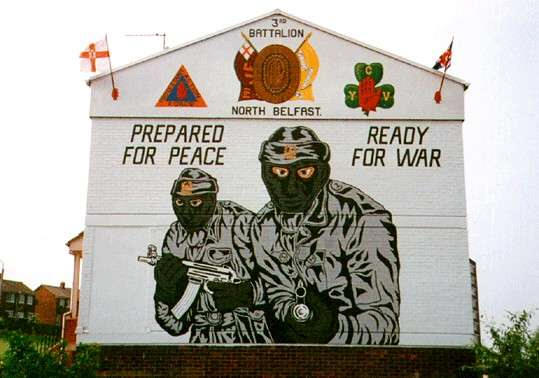
Loyalist mural
http://peacelinetours.g2gm.com/murals.html - broken link
added 13 July 2004
Related
https://www.theguardian.com/politics/2008/mar/18/
northernireland.past
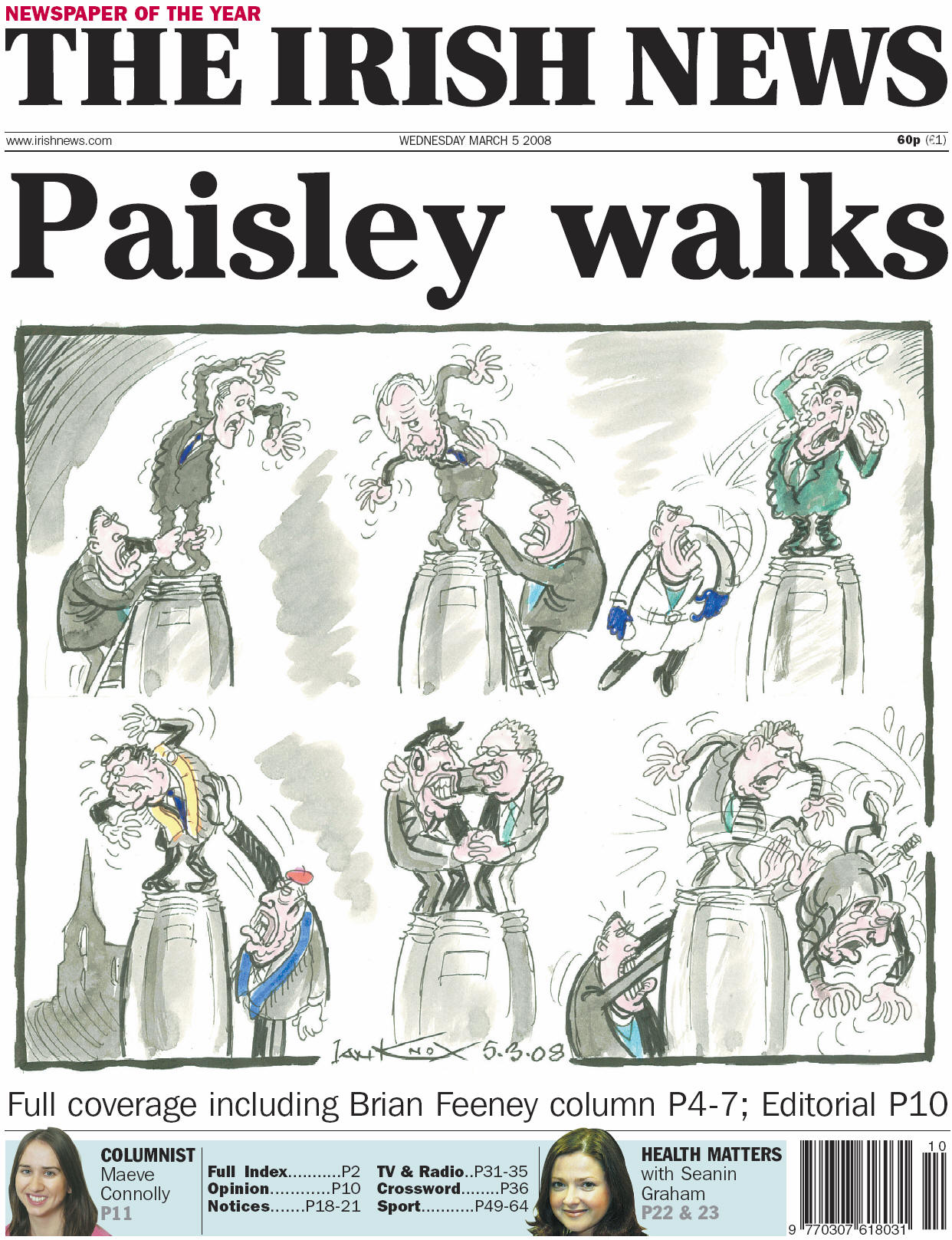
Northern Ireland
Assembly
https://www.niassembly.gov.uk/
first
minister
Ulster Unionist
Ulster Unionist party UUP
https://www.theguardian.com/politics/2005/may/17/
uk.northernireland
loyalist paramilitaries
dissident loyalist paramilitaries
The United Kingdom of Great
Britain and Ireland
was a sovereign state
that existed between 1801 and
1922.
It was established by the Acts of Union 1800,
which merged the kingdoms of Great Britain and Ireland
into a unified state.
The establishment of the Irish Free State in 1922
led to the country later being renamed to
the United Kingdom of Great Britain and Northern
Ireland
in 1927,
which continues to exist in the present day
(27 December 2020)
https://en.wikipedia.org/wiki/
United_Kingdom_of_Great_Britain_and_Ireland
https://en.wikipedia.org/wiki/
United_Kingdom_of_Great_Britain_and_Ireland
The Acts of Union 1800
(sometimes referred to as a single Act of Union 1801)
were parallel acts of the Parliament of Great Britain
and the Parliament of Ireland
which united the Kingdom of Great
Britain and the Kingdom of Ireland
(previously in personal union)
to create the United Kingdom of Great Britain and Ireland.
The acts came into force
on 1
January 1801,
and the merged Parliament of the
United Kingdom
had its first meeting on 22
January 1801.
- Wikipedia, 27 December 2020
https://en.wikipedia.org/wiki/Acts_of_Union_1800
https://en.wikipedia.org/wiki/
Acts_of_Union_1800
Corpus of news articles
Terrorism, Politics > Northern Ireland
Factbox:
Fraught Anglo-Irish conflict
goes back centuries
Tue May 17, 2011
7:38am EDT
Reuters
(Reuters) - Britain's Queen Elizabeth arrived in Dublin on
Tuesday on a four-day state visit to the Irish Republic, the first visit by a
British monarch since Ireland won independence from London in 1921.
Here are details of the historical roots of Anglo-Irish relations:
* English King Henry II landed in Ireland in 1172 after winning support from the
pope to become its overlord. The next five centuries were marked by repeated
battles for control.
* In the 14th century, the Crown tried to prevent English settlers integrating
with the locals by outlawing the Irish language and making intermarriage
illegal.
* Battles for Ireland have had a religious dimension since the 1530s, when
England's King Henry VIII broke with Roman Catholicism to found the Protestant
Church of England. Catholic estates in Ireland were dissolved and the land given
to the king's supporters. A 1534 revolt was crushed.
* In the reign of Henry's daughter Elizabeth I, more British aristocrats took
over estates in Ireland in a colonization, or "plantation," policy justified as
a moral crusade to turn Gaelic Irish away from Catholicism. A rebellion led by
Hugh O'Neill was thwarted in 1603.
* Settlers from Scotland came to Northern Ireland in large numbers under King
James I. They were allowed to buy up grants of land very cheaply in the early
17th century.
* In 1649 Oliver Cromwell, a strict Protestant who had taken power in England
after a civil war, landed in Ireland with 3,000 men and overran the country,
killing one quarter of Ireland's Catholics. A reviled Penal Code barred
Catholics from teaching, owning land, voting or serving in the military.
* In 1690 Catholics were defeated by England's Protestant King William III --
William of Orange -- at the epic Battle of Boyne. Ulster Protestants still call
themselves Orangemen and commemorate the battle.
* The Irish parliament was abolished by Britain in 1801, heralding a century
during which demands grew steadily for Irish home rule.
* The horrific potato famine of 1845 cut the Irish population by at least 2
million through emigration and starvation, and fueled hatred of absentee
landlords who levied high taxes on their malnourished workers.
THE 20th CENTURY:
* In 1905 Sinn Fein ("We Ourselves") became a political party committed to Irish
independence. Ireland's main political parties today, Fianna Fail and Fine Gael,
both would later emerge from Sinn Fein.
* In April 1916, a band of nationalists in Dublin led the abortive Easter Rising
against British rule. They were forced to surrender by British artillery
shelling and leaders were court-martialed and executed, releasing a wave of
anger toward the British authorities.
* Eamon de Valera, the senior survivor of the rising, led Sinn Fein to win a
majority of Ireland's seats in the British parliament in the election of 1918.
Instead of joining the British parliament, they formed their own assembly, which
declared independence. An Anglo-Irish war followed.
* The British government partitioned the island in 1921, separating Northern
Ireland with its "loyalist" Protestant majority from predominantly Catholic
Ireland.
* The 1921 Anglo-Irish Treaty between a delegation of Irish pro-independence
leaders and Britain established the Irish Free State, a self-governing dominion
within the British Empire, in 1922. Northern Ireland remained part of the United
Kingdom.
* De Valera refused to accept the treaty. Ireland was plunged into civil war
between supporters and opponents, who believed the treaty did not do enough to
secure independence.
* Ireland broke its remaining ties with Britain at the end of 1937 with a new
constitution, which replaced the Free State with the modern state of Ireland.
The 1948 Republic of Ireland Act declared Ireland a republic, ending its status
as a dominion of the British crown.
* Many members of the Catholic minority in British-ruled Northern Ireland have
continued to seek the unification of the island, while Protestants favored
continued British rule. Between the late 1960s and 1990s, a period known as "The
Troubles," about 3,600 people died in violence there, which largely ended with a
peace agreement in 1998.
Sources: Reuters/www.britannica.com/
Penguin Dictionary of 20th
Century History/
(Writing by David Cutler; Editing by Peter Graff;
London
Editorial Reference Unit)
Factbox: Fraught
Anglo-Irish conflict goes back centuries,
R,
17.5.2011,
http://www.reuters.com/article/2011/05/17/
us-ireland-queen-britain-relations-idUSTRE74G2UI20110517 - broken link
The hands of history:
Two worlds come together
to broker a new era of hope
David McKittrick witnesses the first meeting
between the two commanding
political figures in Belfast
as they calmly sit side by side to discuss
the
future of Northern Ireland
Published: 27 March 2007
The Independent
Ian Paisley and Gerry Adams did not shake hands yesterday: they had no need
to, since their manner of signalling they are ready to go into government
together produced an even more telling and forceful image.
The substance of what they said was breathtaking enough, but the way they did it
was even more phenomenal: they sat calmly side by side, exuding a sense of
purpose and the intention of doing serious business together.
The picture of Belfast's two commanding political figures, flanked by their
senior lieutenants, carried a subliminal but unambiguous message: after 3,700
deaths the Troubles are over and real politics can begin.
The two warriors of the Troubles believe they can work together. The statements
they delivered in the ornate surroundings of a Stormont dining-room were
exquisitely crafted to avoid giving anyone offence.
The big news they contained was that Sinn Fein and the Democratic Unionist Party
will be going into government together, launching a new era and underpinning the
peace process with a political foundation.
But even more striking was the absence of accompanying threats or conditions -
no begrudgery, no condemnations, no blame game. The two listened carefully and
politely to each other, conveying something new in Belfast politics - mutual
respect.
For many months, London, Dublin, Washington, republicans and just about everyone
else have pressed Mr Paisley to go for power-sharing with Sinn Fein. He has
finally done so, and done so handsomely, with no hint of reservation or even
tension. Until now, he has not even spoken to Mr Adams or any Sinn Fein
representative, leading some to assume that no breakthrough could be expected at
their first encounter.
But a breakthrough came and, by letting the cameras in to witness it, the
parties provided an image that will take its place among key moments in other
peace processes across the world.
Many in Belfast reacted with shock and awe: shock that the leaders of loyalism
and republicanism should have finally struck a deal, awe that it had been done
without histrionics but in such a business-like manner. Mr Paisley announced the
timetable for devolution with a phrase no one has ever heard him use before:
"Today we have agreed with Sinn Fein that this date will be Tuesday 8th May
2007." He added: "We must not allow our justified loathing of the horrors and
tragedies of the past to become a barrier to creating a better and more stable
future."
The two statements were studiously symmetrical. Mr Adams provided an echo by
accepting that "the relationships between the people of this island have been
marred by centuries of discord, conflict, hurt and tragedy." He continued: "The
discussions and agreement between our two parties shows the potential of what
can now be achieved."
The sense of mutual satisfaction was also evident in London and Dublin, with the
two governments cock-a-hoop at what they describe as the successful slotting in
of the last piece of a jigsaw that has taken a painstaking decade to put
together.
Tony Blair said proudly: "Everything we have done over the past 10 years has
been a preparation for this moment." The Irish Prime Minister, Bertie Ahern,
lauded the deal as having "the potential to transform the future of this
island."
There was also a welcome from the United States, since the Bush and especially
the Clinton administration have been closely involved in the peace process.
Washington said it looked forward to the dawning of "a new era for Northern
Ireland".
Although long anticipated, the actual accomplishment of an agreement for
government caused near-incredulity on the streets of Belfast.
The Government long ago set yesterday as a deadline, with the Northern Ireland
Secretary, Peter Hain, proclaiming - more than 50 times, by the DUP's count -
that it was "devolution or dissolution." A meeting of the Assembly set for noon
yesterday was abandoned, and the transfer of powers from London postponed until
8 May. But the loss of six weeks of devolution is regarded as a negligible price
to pay for such an advance.
Although a devolved administration was expected at some stage, until yesterday
many wondered how well it could function if Mr Paisley maintained his no-talk
stance. As First Minister he would, in particular, be expected to work alongside
Martin McGuinness, who last night accepted the post of Deputy First Minister
after being nominated by Sinn Fein. Mr Paisley has, however, now specifically
said he will have regular meetings with Mr McGuinness.
It will be fascinating to see what relationship may develop between the
Protestant patriarch and the one-time IRA commander. But if yesterday's
introductory Paisley-Adams performance is anything to go by, the expected
friction may be less than anticipated, given that the two men have spent a full
generation eyeing each other from opposite ends of the political spectrum.
Their lives have in a sense been intertwined. One of the formative political
experiences of Gerry Adams's life was a bout of serious rioting that broke out
in the Falls Road area of Belfast in 1964, when he was 16.
In his biography, Mr Adams blamed the disturbances on "a rabble-rousing,
sectarian anti-Catholic demagogue named Ian Paisley" who had threatened to
remove an Irish tricolour from the district. In the years since then, Mr Paisley
has reciprocated by describing Mr Adams with a battery of uncomplimentary names.
Those early riots pre-dated the Troubles proper, in which the loyalist and the
republican were to play prominent roles.
For decades, Mr Paisley flew a strictly fundamentalist flag, insisting that
attempts to form power-sharing governments involving Unionists and nationalists
were to be opposed at all costs. As leader of the Democratic Unionist party he
denounced Unionist leaders who sought to set up cross-community governments as
traitors, an attitude that he maintained with extraordinary consistency from the
1960s until a few years ago.
Mr Adams, as the republican movement's outstanding leader, was equally opposed
to such arrangements, though from an entirely different perspective. He held
they were diversions from the central problem, which he defined as the British
presence in Northern Ireland.
While the pair maintained those positions for decades, Mr Adams was the first of
the two to broaden his analysis and definition of the issues, seeking secret
meetings with a range of political figures and others.
By the 1990s, those efforts produced an IRA ceasefire as republicans tested the
proposition that the negative power of their violence could be replaced by entry
into politics, with votes proving more effective than guns.
This peace process, which reduced but did not remove violence, was - in its
early years - a highly controversial project, with Mr Paisley leading the ranks
of those who condemned it and wanted it closed down.
But as the death rate fell and a semblance of normality returned to Belfast, the
benefits of the process became clear. It provided huge benefits to Sinn Fein,
whose vote rose dramatically so that it has become Northern Ireland's largest
nationalist party.
The process was much more problematic for Mr Paisley, who was opposed to the
whole thing in principle and by gut instinct. But his party nonetheless accepted
posts in a power-sharing administration while refusing to attend cabinet
meetings with Sinn Fein, a stance that rivals described as "semi-detached".
Republicans have remained solidly attached to the peace process, with the IRA
eventually decommissioning its armoury and saying it was going out of business.
A key moment came when the DUP grew to become the largest Unionist party, a
position that meant Mr Paisley would get to be First Minister in any new
administration. That gave him the chance of moving on from perpetual opposition
and into powerful office.
He and his party brooded on the options for many months. Its choices were to
simply say no, thus blocking the formation of a new administration, or to agree
to take part in a coalition dominated by itself and Sinn Fein. He would be First
Minister but it would mean placing hmself at the head of a project he had spent
years condemning.
While the signs are that he decided some time ago that he would go for
devolution, a defining moment came earlier this month with elections to the
Assembly. His party scored a triumphant victory, banishing candidates who were
opposed to power-sharing.
On Saturday, a resolution supporting power-sharing was put to his party
executive and passed overwhelmingly, with some in the ranks who had seemed to be
doubters changing their position to one of support for the idea. All of that
amounted to approval for Mr Paisley going into government with a united party
and indeed a united Protestant electorate behind him, a level of support that
gave him the confidence to do business with his lifelong foes.
What happens next?
* The clock is ticking towards 8 May, the date set for the transfer of powers
from London to the Belfast Assembly. In the meantime, both Sinn Fein and the DUP
will attempt to postpone unpopular new water rates. They will also be calling on
Gordon Brown to increase a £1bn boost planned for the new administration. In the
next few days, work will also begin on a programme for government to be ready
for devolution. On 8 May, Ian Paisley and Martin McGuinness are to be nominated
as First Minister and Deputy First Minister. The Assembly's four largest parties
will also nominate 10 departmental ministers.
Shaking the world
GORBACHEV and REAGAN (19 November 1985)
After more than 40 years of nuclear brinkmanship, the two met in Geneva to talk
about scaling back their arsenals and did the unthinkable - they shook hands.
RABIN, ARAFAT and CLINTON (13 September 1993)
Bitter rivals Yitzhak Rabin and Yasser Arafat shook hands at the White House. It
was the ultimate symbol of commitment to the Middle East peace process by two
men who were seen as lifelong enemies
MANDELA and DE KLERK (4 May 1990)
Mandela shook hands with the person who had come to symbolise the government
that imprisoned him. Although they remained bitter rivals, the moment came to
symbolise their commitment to South African society
NIXON and MAO (February 1972)
Setting aside two decades of bitter animosity, Nixon's surprise visit to
Communist China in 1972 and his subsequent handshake with the Chinese leader,
Mao Zedong, was described at the time as a meeting that "shook the world".
BEGIN and SADAT (26 March 1979)
The first of the Middle East's momentous handshakes, with Jimmy Carter at the
White House, sent shockwaves through the region. It ended 30 years of war
between Israel and Egypt, but led to Anwar Sadat's assassination.
The hands of history:
Two worlds come together to broker a new era of hope,
I, 27.3.2007,
http://news.independent.co.uk/uk/ulster/article2396057.ece
November 28, 1975
Enemy of IRA bombers
killed outside home
From the Guardian archive
Friday November 28, 1975
Guardian
Peter Chippindale
and Martin Walker
Mr Ross McWhirter, the television
broadcaster and co-editor of the Guinness Book of Records, was shot dead at his
London home last night, three weeks after he had launched a £50,000
Beat-the-Bombers campaign.
He was hit in the head and stomach
when he answered the door at his home in Enfield, north London.
He was taken to Chase Farm hospital, nearby, where he later died. There was
strong speculation that the shooting was the work of the IRA, and yet another
escalation of their present terrorist campaign.
Mr McWhirter lived in a house standing in its own grounds. When [he] opened his
front door, it was to greet his wife, who had just arrived by car. The gunmen
had apparently been hiding in bushes in the garden. Last night his wife was
staying locally with friends. Their two sons, Ian and Jamie, were at school at
Marlborough.
Mr McWhirter was best known for co-editing the Guinness Book of Records with his
identical twin, Norris. The publication has grown to become one of the most
successful books ever published. However, he had recently gained publicity with
his plans to combat terrorism. His organisation Self-Help offered a reward of
between £20,000 and £50,000 for information leading to the conviction of
terrorist bombers in Britain.
In October, Mr John Nundy, licensee of the Bay Horse Hotel, Winteringham, near
Scunthorpe, won a High Court injunction with financial help from Mr McWhirter,
to free his vehicle from the Eagle car ferry, which was held up by a labour
dispute at Southampton.
Mr Nundy said last night: "I am deeply sorry. He was very much a people's man.
He was in favour of justice and fairness for ordinary people."
MPs immediately condemned what Tory MP Mr John Stokes said was the first killing
in England which had followed the examples of scores of murders in Northern
Ireland.
Mr Eldon Griffiths, Conservative MP for Bury St Edmunds, said: "There is no way
of dealing with this kind of obscenity without a return to the capital
sentence."
Three weeks ago, launching his Beat-the-Bombers campaign, Mr McWhirter said a
man had to live by his beliefs, and he was prepared to back them with action.
"We are gradually wallowing into a situation of terror and violence, and not
enough is being done to stop it." This was one of eight killings for which the
so-called Balcombe Street gang of IRA terrorists received jail terms in 1977.
From the Guardian
archive >
November 28, 1975 >
Enemy of IRA bombers killed outside home,
G,
Republished 28.11.2006,
https://www.theguardian.com/news/1975/nov/28/
mainsection.martinwalker
Related > Anglonautes >
Vocapedia
terrorism, politics > Northern Ireland
terrorism, politics
> Northern Ireland > Catholics
genocide, war,
weapons, arms sales,
espionage, torture
conflicts, wars, climate, poverty
>
asylum
seekers, displaced people,
migrants, refugees
worldwide
terrorism, global terrorism,
militant groups,
intelligence, spies, surveillance
miscarriage of justice > UK, USA
religions
violence > Northern Ireland > The
Troubles
politics > UK
Justice
war
painting > street art > artwork, graffiti, murals
Related > Anglonautes > History
England, Great Britain,
British Empire, United Kingdom
From Ancient Britain
to the early 21st century
20th century
> Northern Ireland
Related > Anglonautes > History >
Maps
UK > Definition, maps and flags
Northern Ireland > Maps
Related
Reuters > Factbox: Fraught
Anglo-Irish conflict goes back centuries
https://fr.reuters.com/article/idUSTRE74G2UI
20110517
Reuters > Timeline: Long road to
Northern Irish settlement
https://www.reuters.com/article/us-ireland-queen-north/
timeline-long-road-to-northern-irish-settlement-idUSTRE74G2UJ
20110517
Reuters > Timeline - Worst IRA bomb
attacks on mainland Britain 1974-2011
https://www.reuters.com/article/
uk-britain-security-bombings-idUKTRE74F31Q
20110516
Lockerbie bombing
Pan Am Flight 103
Lockerbie, Scotland 21 December 1988
https://www.theguardian.com/uk/lockerbie
https://www.theguardian.com/uk/1988/dec/23/
lockerbie.fromthearchive
Terror fiction > 'the Paris
bombing of 2009'
https://www.theguardian.com/politics/2004/feb/05/
iraq.iraq3
Related >
Anglonautes > Videos > Documentaries > 2010s
Surveillance >
NSA
Terrorism > 9/11
Terrorism > 9/11 > CIA > torture
USA / Cuba > Terrorism > Guantánamo Bay
War
|